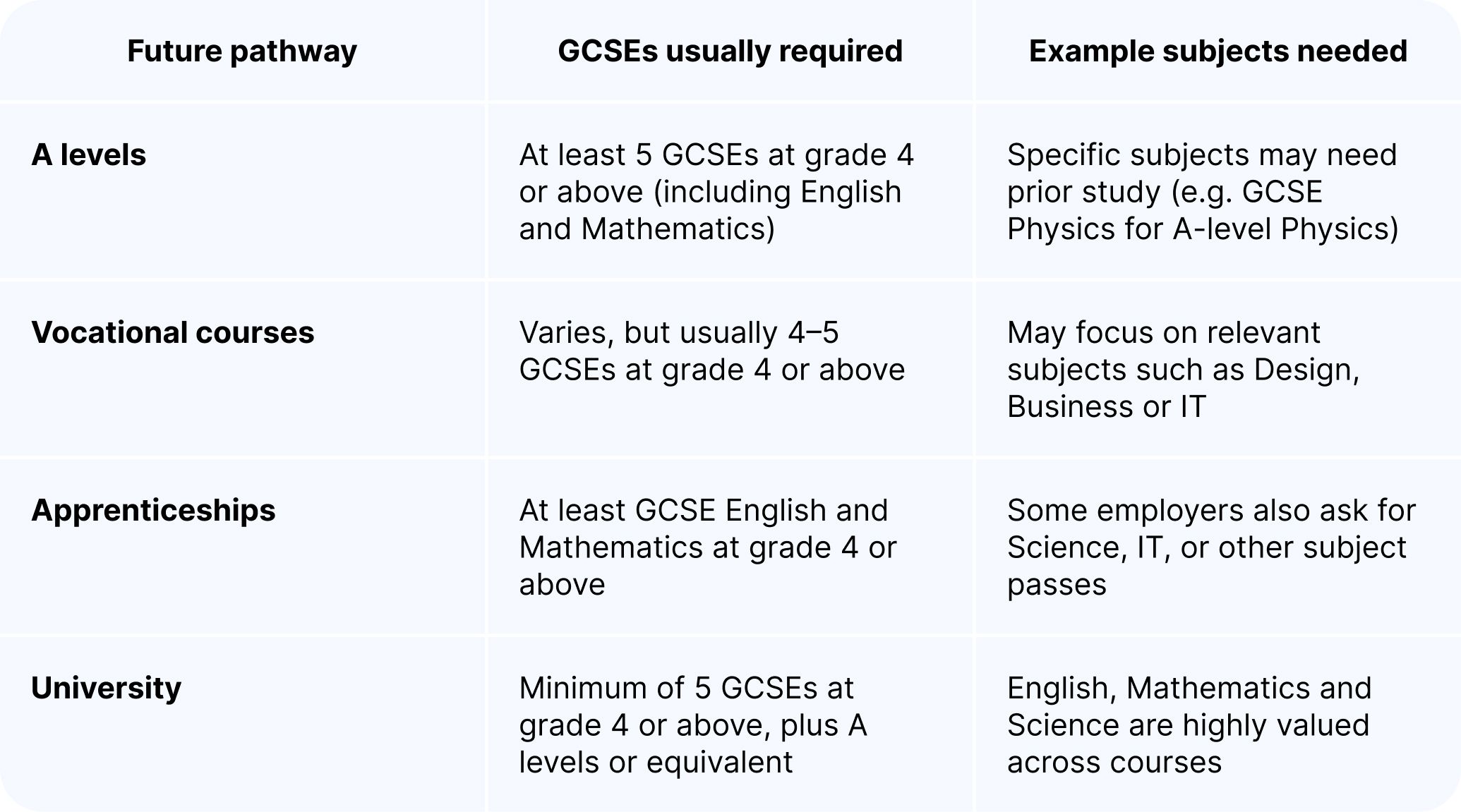How many GCSEs do you need? A guide for students and parents
By Atom | Sep 9, 2025, 1:27 PM
Contents
Choosing GCSE subjects is one of the most important steps in a student’s education journey. Many parents and students wonder how many GCSEs are needed, and the good news is that there is a clear and manageable answer.
This guide explains the typical number of GCSEs, why it matters, and how students can make the best choices for their future.
What this post covers:
The typical number of GCSEs students take
Why GCSE subject choices matter
Which GCSEs are compulsory
How optional subjects work
How GCSE choices impact future study and careers
What is the typical number of GCSEs?
Most students in England take between 8 and 10 GCSEs. Some take as many as 11 or 12, while others take fewer, depending on their school, personal circumstances or additional needs.
Average number: 9 subjects
Lower range: 7–8 subjects
Upper range: 11–12 subjects
The upper range is usually suited to students who are academically strong, highly motivated, and capable of managing a larger workload.
Schools that timetable additional subjects such as a second foreign language, Further Mathematics, or an extra humanities subject may also offer this opportunity. These extra qualifications can be valuable for students aiming for competitive sixth forms or universities, but are not essential for success.
Students don’t need to make this decision alone. Schools provide structured support through:
Options evenings or information sessions for students and parents to explore available subjects
Conversations with teachers and subject leaders to help match choices to a student’s strengths and interests
Support from tutors or careers advisers who can ensure decisions align with long-term goals, such as A levels, apprenticeships or specific career paths
Clear advice on balance, often reminding students that achieving strong grades across a manageable number of subjects is more valuable than spreading themselves too thin
This guidance ensures that students feel supported, reassured, and confident that their final subject list is right for them.
Which GCSE subjects are compulsory?
Every student is required to take certain core subjects at GCSE. These ensure that everyone leaves school with a strong foundation of essential knowledge and transferable skills.
Compulsory GCSE subjects include:
Science (either Combined Science worth 2 GCSEs, or separate sciences: Biology, Chemistry and Physics)
Students will take at least 5 GCSEs as part of the core curriculum. These subjects are highly valued by all sixth forms, colleges, and employers, making them the backbone of a student’s GCSE qualifications.
Take a look at our guide to choosing between Combined and Triple Science GCSE.
Which GCSE subjects are optional?
Alongside the compulsory subjects, students usually choose 3–4 optional GCSEs. These allow students to tailor their learning to their interests, strengths, and future goals.
Examples of optional GCSEs include:
Modern Foreign Languages (such as French, Spanish or German)
Technology subjects (such as Design and Technology, Food Preparation, or Computer Science)
Physical Education
Many schools encourage students to take at least one subject from the EBacc (English Baccalaureate) group: History, Geography, or a Modern Foreign Language.
The EBacc is a performance measure for schools that highlights students who study a broad academic mix of subjects, which is often seen as keeping more future study options open.
When choosing optional subjects, it’s important to strike a balance. Some students prefer to focus on practical or creative areas such as Art or Music, while others choose academic pathways with History, Geography and Languages.
Schools usually advise students to keep a mix, so that future career and study options are not closed off too early.
Why GCSE subject choices matter
GCSEs are not just about grades; they shape future pathways. Choosing the right balance of subjects ensures students keep doors open for sixth form, apprenticeships, or university.
Strong GCSE results in a wide range of subjects show that students can:
Manage demanding studies across different areas
Handle a variety of assessments confidently, including essays, exams, and coursework
Build essential skills such as critical thinking, analysis, creativity, communication, and problem-solving
For many students, GCSEs also allow them to try out new subjects that may not have been available in earlier years. For example, Psychology, Sociology, or Business Studies are sometimes first introduced at GCSE level. These early experiences can spark interests that shape long-term research and career choices.
How GCSE choices impact students’ futures
The number and type of GCSEs taken can influence what comes next:

It’s worth noting that grade 4 is considered a “standard pass” (equivalent to the old grade C), while grade 5 is often described as a “strong pass.” Higher grades may be required for competitive sixth forms, apprenticeships, or universities.
This is why selecting the right subjects, particularly those a student enjoys and feels confident in, can make a big difference.
Key takeaways
Most students take between 8 and 10 GCSEs.
English, Mathematics and Science are compulsory, making up at least 5 GCSEs.
Students then choose 3-4 optional subjects, often including a humanities, a language, or a creative subject.
GCSE choices influence A levels, apprenticeships and university applications, shaping opportunities after Year 11.
Final thoughts
There is no single ‘perfect’ number of GCSEs to take; what matters most is choosing subjects that balance core requirements with personal strengths and future aspirations. For some students, this might mean 8 GCSEs with a strong focus on core subjects and a few areas of passion, while for others it may mean 11 or more, including additional Languages or Sciences. Both approaches can be successful.
The key message for parents and students is that no one makes these decisions in isolation. Schools provide structured guidance, teachers offer honest advice, and careers staff ensure that choices link smoothly to the next stage of education or training. With this support, students can confidently approach their GCSEs, knowing they are building strong foundations for the future.
Don’t miss Atom’s GCSE giveaway!

Six months. Six epic prizes. Six chances to make the GCSE season unforgettable.
We’re launching Atom for GCSE prep in 2026, and to celebrate, over the next six months, we’re giving away thousands of pounds worth of prizes to help your child level up their GCSE revision.
Here’s a taste of what’s up for grabs:
The latest Apple tech, including an iPad Air, Vision Pro and more
Festival tickets for Boardmasters and Reading 2026
Europe interrail passes and £1,000 spending money
…and that’s just a few of the amazing prizes available.
Our first two winners have already taken home incredible prizes! Find out who they are and what they won in our latest giveaway update and keep an eye out for news of our November winner.
It’s free to join. UK only. Full T&Cs apply.
Contents
